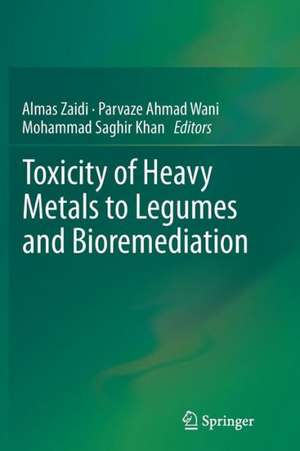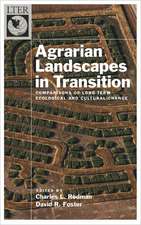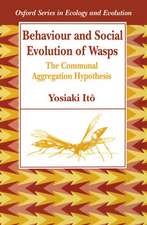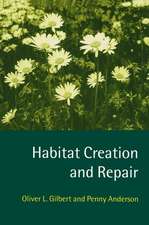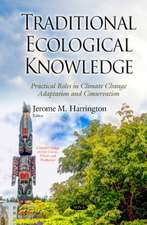Toxicity of Heavy Metals to Legumes and Bioremediation
Editat de Almas Zaidi, Parvaze Ahmad Wani, Mohammad Saghir Khanen Limba Engleză Paperback – 16 apr 2014
| Toate formatele și edițiile | Preț | Express |
|---|---|---|
| Paperback (1) | 943.43 lei 6-8 săpt. | |
| SPRINGER VIENNA – 16 apr 2014 | 943.43 lei 6-8 săpt. | |
| Hardback (1) | 947.35 lei 6-8 săpt. | |
| SPRINGER VIENNA – 21 mar 2012 | 947.35 lei 6-8 săpt. |
Preț: 943.43 lei
Preț vechi: 1150.52 lei
-18% Nou
Puncte Express: 1415
Preț estimativ în valută:
180.55€ • 187.80$ • 149.05£
180.55€ • 187.80$ • 149.05£
Carte tipărită la comandă
Livrare economică 15-29 aprilie
Preluare comenzi: 021 569.72.76
Specificații
ISBN-13: 9783709116845
ISBN-10: 3709116848
Pagini: 260
Ilustrații: XII, 248 p.
Dimensiuni: 155 x 235 x 14 mm
Greutate: 0.39 kg
Ediția:2012
Editura: SPRINGER VIENNA
Colecția Springer
Locul publicării:Vienna, Austria
ISBN-10: 3709116848
Pagini: 260
Ilustrații: XII, 248 p.
Dimensiuni: 155 x 235 x 14 mm
Greutate: 0.39 kg
Ediția:2012
Editura: SPRINGER VIENNA
Colecția Springer
Locul publicării:Vienna, Austria
Public țintă
ResearchCuprins
1 Soil contamination, Nutritive value and Human health risk assessment of heavy metals: An Overview.- 2 Heavy Metal Toxicity to Symbiotic Nitrogen Fixing Microorganism and Host Legumes.- 3 Toxic Effects of Heavy Metals on Germination and Physiological Processes of Plants.- 4 Chromium-Plant Growth Promoting Rhizobacteria Interactions: Toxicity and Management.- 5 The influence of glutathione on the tolerance of Rhizobium leguminosarum to cadmium.- 6 Bioremediation: A Natural Method for the Management of Polluted Environment.- 7 Rhizobium-legume symbiosis: A model system for the recovery of metal contaminated agricultural land.- 8 Microbially mediated transformations of heavy metals in rhizosphere.- 9 Rhizoremediation: A Pragmatic Approach for Remediation of Heavy Metal Contaminated Soil.- 10 Role of Plant Growth Promoting Rhizobacteria in the Management of Cadmium Contaminated Soil.- 11 Site-specific optimization of arbuscular mycorrhizal fungi mediated phytoremediation.- 12 Heavy Metal Resistance in Plants: a Putative Role of Endophytic Bacteria.- 13 Importance of Arbuscular Mycorrhizal Fungi in legume Production under Heavy Metal Contaminated Soils.-
Notă biografică
Almas Zaidi, received M.Sc. and Ph.D. (Agricultural Microbiology) degree from Aligarh Muslim University, Aligarh, India and currently serving as Guest faculty/Assistant Professor at the Department of Agricultural Microbiology, Aligarh Muslim University, Aligarh, India. Dr. Zaidi has been teaching Microbiology at post graduate level for the last six years and has research experience of 14 years. She has published about 40 research papers, book chapters and review articles in journals of national and international repute. Dr. Zaidi has edited five books published by the leading publishers. Her main focus of research is to address problems related with rhizo-microbiology, Microbiology, Environmental Microbiology, and biofertilizer technology.
Parvaze Ahmad Wani, obtained Ph.D. (Agricultural Microbiology) degree from Aligarh Muslim University, Aligarh, India and is presently working as an Assistant Professor and Head, Department of Biological Sciences, College of Natural and Applied Sciences, Crescent University, Abeokuta, Ogun State, Nigeria. Dr. Wani has sufficient experience of both teaching and research at master level. Dr. Wani has published over 30 research papers including original research, review articles and book chapters both at national and international level. He has also published one book from Germany related to his vast experience and broad understanding of the subject. Dr. Wani has also received a highly prestigious award given to young scientists by the Department of Science and Technology, Government of India. His thrust area of research includes Environmental Microbiology and Rhizobiology.
Mohammad Saghir Khan, Ph.D. is an AssociateProfessor at the Department of Agricultural Microbiology, Aligarh Muslim University, Aligarh, India. Dr. Khan received M.Sc. from Aligarh Muslim University, Aligarh, India and Ph.D. (Microbiology) from Govind Ballabh Pant University of Agriculture & Technology, Pantnagar, India. He has been teaching Microbiology to Post-Graduate students for the last 15 years and has research experience of 19 years. In addition to his teaching, Dr. Khan is engaged in guiding students for their doctoral degree in Microbiology. He has published over 60 scientific papers including original research articles, review articles and book chapters in various national and international publication media. Dr. Khan has also edited seven books published by the leading publishers. Dr. Khan is deeply involved in research activities focusing mainly on Rhizobiology, Microbiology, Environmental Microbiology especially heavy metals-microbes-legume interaction, bioremediation, pesticide-PGPR-plant interaction, biofertilizers and rhizo-immunology.
Parvaze Ahmad Wani, obtained Ph.D. (Agricultural Microbiology) degree from Aligarh Muslim University, Aligarh, India and is presently working as an Assistant Professor and Head, Department of Biological Sciences, College of Natural and Applied Sciences, Crescent University, Abeokuta, Ogun State, Nigeria. Dr. Wani has sufficient experience of both teaching and research at master level. Dr. Wani has published over 30 research papers including original research, review articles and book chapters both at national and international level. He has also published one book from Germany related to his vast experience and broad understanding of the subject. Dr. Wani has also received a highly prestigious award given to young scientists by the Department of Science and Technology, Government of India. His thrust area of research includes Environmental Microbiology and Rhizobiology.
Mohammad Saghir Khan, Ph.D. is an AssociateProfessor at the Department of Agricultural Microbiology, Aligarh Muslim University, Aligarh, India. Dr. Khan received M.Sc. from Aligarh Muslim University, Aligarh, India and Ph.D. (Microbiology) from Govind Ballabh Pant University of Agriculture & Technology, Pantnagar, India. He has been teaching Microbiology to Post-Graduate students for the last 15 years and has research experience of 19 years. In addition to his teaching, Dr. Khan is engaged in guiding students for their doctoral degree in Microbiology. He has published over 60 scientific papers including original research articles, review articles and book chapters in various national and international publication media. Dr. Khan has also edited seven books published by the leading publishers. Dr. Khan is deeply involved in research activities focusing mainly on Rhizobiology, Microbiology, Environmental Microbiology especially heavy metals-microbes-legume interaction, bioremediation, pesticide-PGPR-plant interaction, biofertilizers and rhizo-immunology.
Textul de pe ultima copertă
This title discusses various effects of heavy metal exposure to legumes as well as the bioremediation potential of rhizosphere microbes. Availability of heavy metals, their uptake and the effects of metals on germination and various physiological functions of plants including legumes are presented. Furthermore, the effects of heavy metals to nitrogen fixing microorganisms and how microsymbionts can overcome metal stress is presented in detail. The influence of glutathione on the tolerance of Rhizobium leguminosarum to cadmium is discussed. The role of nitrogen fixers in decontamination of heavy metal toxicity, mycoremediation of metal contaminated soils, microbially mediated transformation of heavy metals and action of plant growth promoting rhizobacteria and nitrogen fixers together in detoxifying heavy metals are broadly explained. This volume is a useful tool for scientists, policy makers and progressive legume growers intending to develop safe and healthy legumes for future generations.
Caracteristici
Describes recent findings on the impact of heavy metals to the performance of legumes. Provides an exclusive view on the development of bioremediation strategies Combines the topics of heavy metal phytotoxicity and bioremediation. Includes supplementary material: sn.pub/extras
